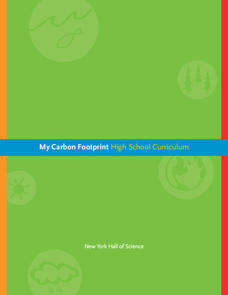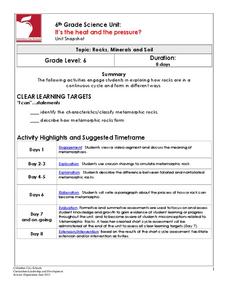NOAA
The Incredible Carbon Journey: Play the Carbon Journey Game
Class members explore the carbon cycle in the final installment of the 10-part Discover Your Changing World series. They play a simulation game where they walk through the steps carbon takes as it cycles through the different layers of...
It's About Time
Orbits and Effects
What does your world revolve around? Challenge the class as they learn about orbits and the effects of them on our modern world. Young astronomers begin by measuring ellipses and calculating the eccentricity of Earth's orbit. Then, they...
PEGAMES.org
Duck Duels
If you're stuck inside on a rainy day for PE, or just want to give your class a body break, try out this fun game involving quick mental math and movement. Waddling around the classroom as ducks, learners compete in math duels, trying to...
Discovery Education
STEM Camp—Urban Infrastructure
Build a bridge to learning in a STEM-aligned unit about urban infrastructure. Young engineers explore the many aspects of civil planning and design in a five-day unit. Content includes the challenging aspects of balancing building with...
New York Hall of Science
My Carbon Footprint: High School Curriculum
The earth has a love-hate relationship with carbon. Learners complete a series of nine lessons that begin with an examination of the role of carbon in Earth's systems. They then relate changes in climate and weather to changes in the...
Core Knowledge Foundation
A Time for All Seasons - Winter
As the days get shorter and a chill enters the air, it's time to start teaching your little ones about the wondrous winter season. Through a series of teacher demonstrations, whole-class read alouds and discussions, and hands-on...
NASA
The Case of the Wacky Water Cycle
Join the tree house detectives in learning about the processes of the water cycle, water conservation, water treatment, and water as a limited resource.
University of Southern California
Wave Erosion Lab
Using a stream table, erosion enthusiasts examine how the density of sediment and how the slope of land contribute to the amount moved by waves. You will not be able to use this entire resource as is; there are teachers' names and...
NASA
Water Works on a Blue Planet
Keep within a water budget. Learners find out that less than 2.5% of Earth's water is available to drink—and that there is a fixed amount of water. Scholars read an interesting article comparing the available water to a game of Monopoly...
Chicago Botanic Garden
Meet the Naturalists
Studying plants is a full-time job—for some. After learning the ins and outs of phenology in the first three lessons in the unit, pupils explore the history of the science. The instructional activity highlights five historical...
Center for Advanced Research on Language Acquisition (CARLA)
Bringing the Biodiversity of Ecuador to Spanish Immersion Classrooms
Designed for the Spanish Immersion classroom, scholars take a look at biodiversity and Ecuador; all the while, practicing their Spanish with a focus on verbs. In small groups, learners examine photographs of the different climate regions...
National Wildlife Federation
Ghost Town
Around 93 percent of the reefs on Australia's Great Barrier Reef have been bleached, and almost one quarter of them are now dead. Scholars research the sea temperatures, especially around the areas with coral reefs, to make connections...
National Wildlife Federation
What is DBH?
When measuring the circumference of a tree, does it matter how high you place the measuring tape? Most scholars have never considered this question, but scientists know that measurement techniques must be standardized. The 13th lesson in...
Science 4 Inquiry
Temperature of Inner Planets
Mars, Earth, and Venus contain atmospheres that generate weather. Young scientists explore the temperature of inner planets. They create a model simulating the greenhouse effect before researching and answering guided questions to...
National Wildlife Federation
Why All The Wiggling on the Way Up?
Some of the CO2 emitted by burning fossil fuels is removed from the atmosphere by natural sinks, such as the ocean. The fifth engaging lesson plan in the series of 21 examines the CO2 data from three very different locations. It then...
PBS
NOVA Sun Lab Lesson Plan
Looking for a sun-sational multi-lesson plan full of videos, simulations, and discussion? Introduce your young scientists to all things solar with a four-part hands-on adventure. Pupils learn the basics of solar anatomy, space weather,...
University of Texas
Observing the Moon
Why does it look like there is a man on the moon? Why does the moon look different every night? These are the focus questions of a lesson that prompts class members to observe and record the nightly changes of Earth's natural satellite.
Prestwick House
Connotative vs. Denotative Meanings
Besides the dictionary definition, words also carry the added weight of meanings that are inferred or implied, meanings conferred on words, or connotations. To gain an understanding the importance of connotation, class members engage in...
Curated OER
Radiation Comparison Before and After 9-11
Using the NASA website, class members try to determine if changes could be detected in cloud cover, temperature, and/or radiation measurements due to the lack of contrails that resulted from the halt in air traffic after the attacks of...
Institute of Electrical and Electronics Engineers
Making Sense of Sensors
Have small groups in your class construct working hygrometers as an example of the benefits of using sensors in engineering. This activity can be used during a weather unit when covering humidity or in a STEM activity as a preparation...
Curated OER
A Season for Chapters
Art, music, poetry, and the beauty of the seasons is what you'll find in this very nice unit idea. You can use any of the suggested books and activities to engage your second graders in an exploration of the changes that take place...
Columbus City Schools
It's the Heat and the Pressure?
Ready for a change? Give a comprehensive collection of metamorphic materials a try! With the assortment of printables and lab activities, you won't be under pressure to keep things lively. The unit culminates by having pupils complete an...
Science 4 Inquiry
An Investigative Look at Florida's Sinkholes
In May of 1981, the Winter Park Sinkhole in Florida first appeared and is now referred to as Lake Rose. Scholars learn about the causes of sinkholes through an inquiry project. Then, they analyze recent data and draw conclusions to...
Virginia Department of Education
Hurricanes: An Environmental Concern
Hurricanes, typhoons, and tropical cyclones are the same type of storm, but their names change based on where they happen. Scholars use a computer simulation to learn about hurricanes. Then they hypothesize ideas to prevent hurricanes...
Other popular searches
- Changes in Weather Patterns
- Changes in Weather
- Measuring Weather Changes
- Daily Weather Changes
- Seasonal Weather Changes
- Measure Changes in Weather
- Changes in the Weather
- Spring Weather Changes
- How Does Weather Changes
- Weather Changes Earth
- Exploring Weather Changes
- Geography Weather Changes

























